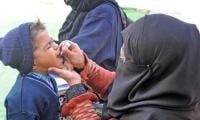STOCKHOLM: Researchers Katalin Kariko and Drew Weissman won the Nobel Medicine Prize on Monday for work on messenger RNA (mRNA) technology that paved the way for groundbreaking Covid-19 vaccines.
The pair, who had been tipped as favourites, “contributed to the unprecedented rate of vaccine development during one of the greatest threats to human health in modern times”, the jury said.
The World Health Organisation declared Covid-19 a pandemic in March 2020 and the first mRNA vaccines were approved for use against the illness in December that year.
Billions of Pfizer/BioNTech and Moderna doses have been injected around the world since then. Together with other Covid vaccines, they “have saved millions of lives and prevented severe disease in many more”, the jury said.
Kariko, 68, and Weissman, 64, longstanding colleagues at the University of Pennsylvania in the United States, have already won a slew of awards for their research. In recognising the duo this year, the Nobel committee broke with its usual practice of honouring decades-old research, aimed at ensuring it has stood the test of time.
While the prizewinning research dates back to 2005, the first vaccines to use the mRNA technology came out just three years ago. Unlike traditional vaccines which use weakened virus or a key piece of the virus´ protein, mRNA vaccines provide the genetic molecules that tell cells what proteins to make, which simulates an infection and trains the immune system for when it encounters the real virus.
The idea was first demonstrated in 1990 but it wasn´t until the mid-2000s that Weissman, of the US, and Hungarian-born Kariko developed a technique to control a dangerous inflammatory response seen in animals exposed to these molecules, opening the way to develop safe human vaccines.
The honour is particularly sweet for Kariko, the 13th woman to win the Medicine Prize, who toiled in obscurity for years and struggled to convince her superiors of the need for research on messenger ribonucleic acid.
Speaking to Swedish Radio (SR), she said her late mother always had faith in her, listening to the Nobel prize announcements “year after year” hoping to hear her daughter´s name called out.
“Unfortunately, five years ago she passed at the age of 89. She might be listening from above,” Kariko said. Thomas Perlmann, the secretary general of the Nobel Assembly, called Kariko “an extraordinary and unusual scientist” who “resisted any temptation” to do “something easier”.
Weissman told AFP he heard the news from Kariko, who received the call from the jury first. “We were wondering if somebody was pulling a prank on us.” “This is the ultimate -- this is the prize I thought of when I was five years old when I started to get interested in how things worked,” he said.
The Federal Bureau of Investigation seal is seen at FBI headquarters in Washington, US June 14, 2018. — ReutersNEW...
Astronaut Wang Haoze will become the third Chinese woman to take part in a crewed mission when the Shenzhou-19 team...
United Nations Secretary-General Antonio Guterres gestures as he attends a news conference in Beirut, Lebanon,...
A Yars intercontinental ballistic missile is launched during Russian military drills on October 29, 2024. — Russian...
The spot where an explosion occurred in a firework storage facility near Hindu temple at Nileshwaram, in the sourthern...
United Nations High Commissioner for Human Rights Volker Turk, right, looks at graffiti on the walls of Dhaka...







